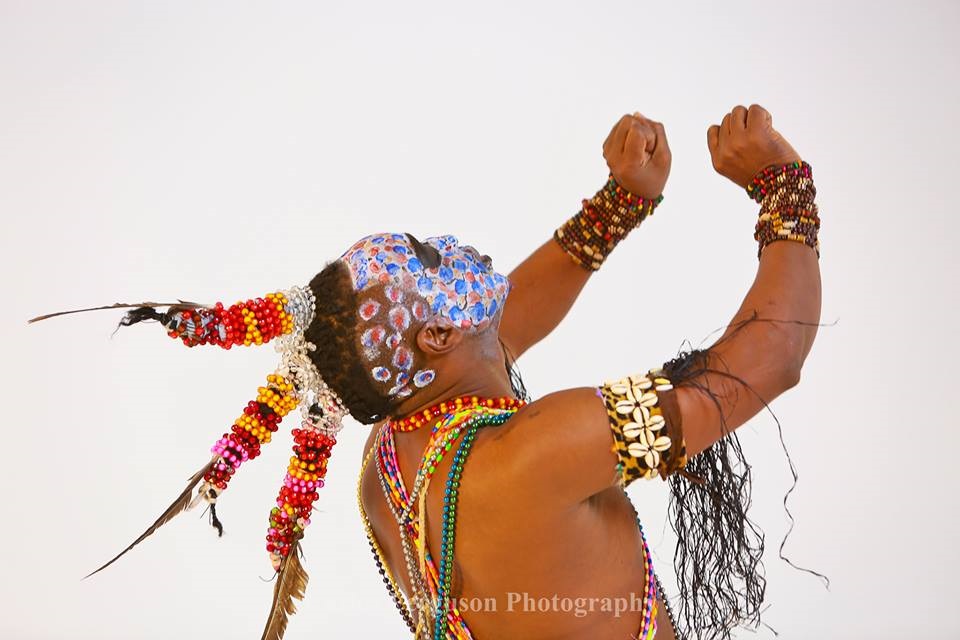Artist Profile: Sani Abu
(photo credit: carlos ferguson)
Sani Abu is the real deal and just may be the most unique African dancer in Toronto. Any given performance by Sani and his dance company Ijo Vudu* will transport you to the Yoruba and Edo cultures of Nigeria and beyond with movement, costuming and music, the likes of which you will seldom see in this city. Strings of beautiful coral Edo beads and wide brimmed black hats, crisp white cotton, brilliant orange costumes contrasting with dark green flowing robes, decorative cowrie shells, multi-coloured beads, bold face and body paint, feathers and fans, it’s all there for your amazement and entertainment.
I first experienced Sani Abu as a solo performer as he opened a show at the Lula Lounge. It was a spiritual experience that thrilled me from head to toe. I have since seen the company perform at Afrofest, Harbourfront and at the annual FESTACC (Festival of African and Caribbean Culture) many times and am always impressed. Sani is dramatic and inventive and you can never be sure what to expect.
I met up with Sani at his dance studio housed at Gotta Dance at Jane and Dundas Streets earlier this year to discuss his life in and love of dance.
Born in southern Nigeria, but raised in the western city of Lagos, Sani comes by all this creativity honestly – it’s in his genes! His mother, a drummer, was particularly influential to his artistry, and Sani learned organically at her knee, as is so often the case in African countries. “I followed her around at her shows from a very young age, maybe 3 or 4, playing a shaker, then a cow bell, then drumming. You know, the way you will see my young son at my shows. I just picked things up” he explains. By the age of 15 he was touring with Benin City’s Uyi-Edo Dance Theatre Troupe and knew that music and dance was his destiny.
(photo credit: carlos ferguson)
He continued to absorb Nigerian culture for many years back home and was trained by top dancers such as Aghabiomon Nogie Ogbeiwi (Uyi-Edo Cultural Troupe), Youssouf Koumbassa (Les Ballet Bagata), Muyiwa Oshinaike a.k.a Babanee (Black Marbles), Felix Okolo (Dance Heritage), Chuck Mike, Candace Hundley-Kamate (Seventh Principle. He appeared in television, film and music videos throughout Nigeria until an irresistible opportunity to perform and train in the USA came up, first in Texas and later New Jersey and New York, places he returns to frequently. He quite happily filled his time and his mind during these years, networking, forming lasting friendships and establishing a solid reputation. But he was primarily engaged in performing in the West African Manding tradition (found in Guinea and Mali and elsewhere) rather than in Nigerian styles. Manding music and dance, after all, has a solid foothold in North America and is the most readily available and most in demand in the mainstream.
In 2005, an invitation to move to Canada was extended. He gave it considerable thought but initially couldn’t imagine uprooting himself and starting all over again. He remembers thinking, “Canada? Why would I want to go there? I don’t know anything about Canada!” Since that time, however, he has fully embraced Toronto and loves the variety of African traditions the practised here, including Congolese, Ghanaian, Ethiopian, South African and much more. It is, in fact, in this very city that Sani has fully returned to his Nigerian roots, sharing his gifts of knowledge and boundless enthusiasm with eager new students looking for something new. He got his dancing foot in the door with the support of dance companies like COBA, and Afrofest and has never looked back.
Despite the financial challenges faced by many artists in this country, Sani is the eternal optimist and allows his ambitions to drive and guide his art. But he has always been a demanding leader in building his dance company, and in his choreography and teaching. “You have to be serious” he says. “I’m ready to train you if you are ready to learn. Many people come and go if they are just in this to make money.” Sani and I look at each other and burst out laughing simultaneously, knowing full well how unrealistic this is – your desire and passion must come from your heart, if you want to be successful by any measure.
Today, along with Ijo Vudu Dance Company, Sani also proudly runs the Sani-Abu School for African and Contemporary Dance where he gives private lessons, classes and workshops in traditional music and dance to all ages from young children to seniors. He holds an Ontario Arts Council/Royal Conservatory of Music Artist Educator Foundation Certificate and has taught in Israel and Ghana. Ijo Vudu International includes dance companies in Ghana and Nigeria and holds an annual conference in Nigeria. Want to hold a traditional wedding or rent or make masks and costumes? Sani offers it all, including catering. He is ambitious and industrious without a doubt.
In 2011, Sani began working with a bright young Nigerian immigrant, new to Canada, Joy Aigbukor. Like a sponge, Joy absorbed everything Sani offered up and today is his right hand gal, administratively and artistically. “This is her life.” Sani says, his admiration shining through. Joy is a woman whose presence on stage and off commands respect, and together, they are a formidable creative force. Anytime you see Sani perform around town, Joy will never be far behind.
(photo credit: peter lear)
This has been a busy year for Sani and crew and by all accounts it will continue to be so. On July 4, Sani and Ijo Vudu will perform Ayo Ni Ijo: Joy in Every Land at Harbourfront’s Kick Up Your Heels Festival in Toronto at 8pm on the WestJet Stage. On November 29th, 2015, Sani heads up the Ijo Vudu International Dance Conference IBADAN 2015 at the Arts Theatre, University of Ibadan in Nigeria. And watch out for news of the wonderful annual Kwanzaa celebration in Toronto in December. Stay tuned at www.ijovududance.com.
Lise Watson
(photo credit: vudu media)
.* In the traditional language of the Yoruba people, ijo vudu (ee-joh voo-doo) refers to the transcendent spirit in dance.





